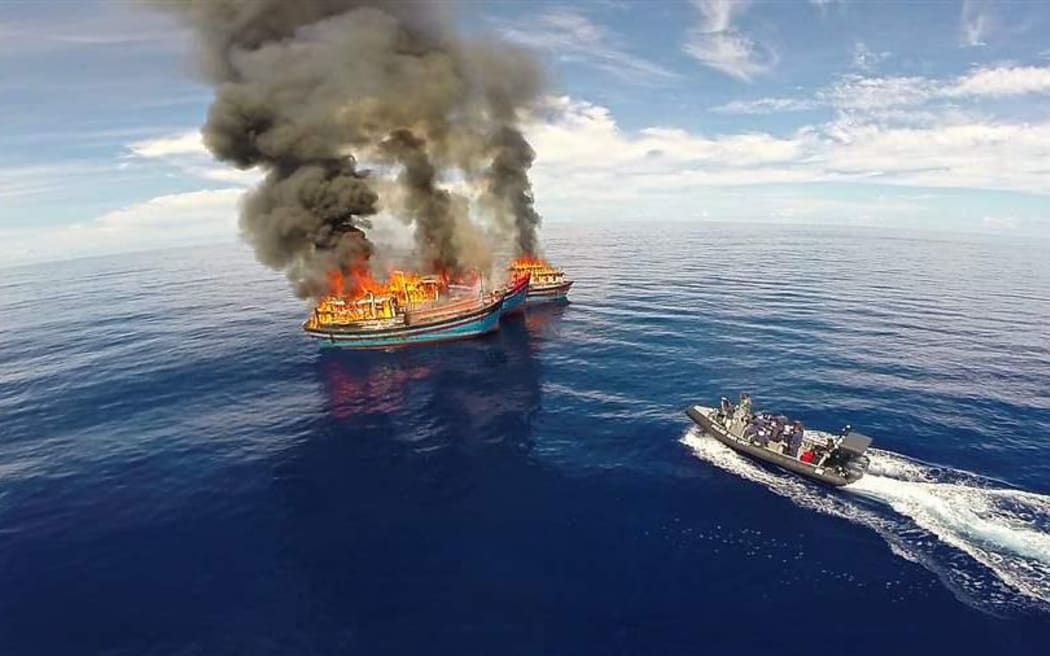Palau’s efforts to combat IUU fishing showing positive results
Thursday 11 May 2023 | Written by RNZ | Published in Palau, Regional

Illegal fishing vessels burnt off Palau waters Photo: RNZI/Pew Trust/23051103
Illegal, unreported, and unregulated (IUU) fishing poses significant risks to Palau, one of the world's most important fishing areas.
Palau has ramped up its efforts to protect its oceans by increasing surveillance and monitoring activities, strengthening its legal framework, and partnering with other countries and international organisations to combat this growing global issue.
President Surangel Whipps Jr told RNZ Pacific that Palau has seen positive impacts on its marine life and economy.
"We're close to Asia, and there's a lot of boats that transit (through) because they're going supposedly to the high seas or going to other fishing grounds," he explained.
"So we have air resources, we have sea resources, we're using satellite tracking...and what we've seen is because of all that effort, there's been a reduction in IUU."
In 2019, Palau ratified the United Nations' Agreement on Port State Measures to Prevent, Deter and Eliminate Illegal, Unreported and Unregulated Fishing, along with its fellow Micronesian countries.
The ambitious aim of the agreement is to have the Pacific free of illegal fishing by this year.
Whipps said they are tracking along impressively thanks to its partnership.
"Australia, the United States, Taiwan, and Japan are coming and helping us with not only troll boats but control centres and technology."
He added that the support received has helped "build capability" in combating IUU fishing.
Palau has also implemented a unique economic approach to combat IUU fishing, known as the Palau National Marine Sanctuary (PNMS).
The sanctuary covers 80 percent of Palau's EEZ, prohibiting all commercial fishing activities in the area.
In exchange, Palau receives significant financial support from various sources, including selling fishing licenses to foreign vessels that operate outside the PNMS.
Faced with the threats of rising sea levels, Palau has embarked on a bold initiative known as the Marine Spatial Plan (MSP).
This comprehensive programme is specifically designed to safeguard Palau's marine ecosystems, which are increasingly vulnerable to climate change and human activities, including tourism, fishing, aquaculture, and shipping.
"Palau has always been a leader in conservation," said Whipps.
"The new MSP process is about generating data to develop best practices to protect 30 percent of the ocean and manage 100 percent of it appropriately.
"As the country is experiencing climate change with sea level rise, ocean warming, and more frequent storms, we should enhance regional and national cooperation for sustainable ocean planning through science and information."
One of the key strengths of the MSP is its emphasis on collaboration and stakeholder engagement.
Palau recognises that a collective effort is required to successfully implement and enforce the plan.
By actively involving local communities, industries, scientific experts, and governmental agencies, Palau aims to foster a sense of ownership and shared responsibility for the sustainable management of its marine resources.
Whipps believes the MSP could be a model for other Pacific nations.
"Our goal is also to demonstrate to our Pacific brothers, large or small, how we can balance protection and production and really come up with a better result for everyone."
The commitment to MSP was announced at the Our Oceans Conference in Panama earlier this year.














































